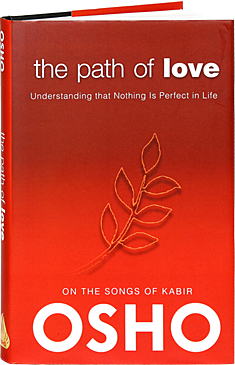The Path of Love (OSHO Classics)

The Path of Love (OSHO Classics)
Understanding That Nothing Is Perfect in Life
Book — Also available in other formats: AudioBookeBook
Kabir is a 15th-century Indian mystic. Born a lower-caste weaver, Kabir opposed superstition, empty ritualism and bigotry. His teachings include scathing attacks against Brahmanical pride, caste prejudice and the very concept of untouchability, as well as exposing the dogmatism and bigotry he perceived around him. Unusually, even for his time, he was embraced by disciples who had been raised in both Hindu and Muslim traditions, who saw in him the embodiment of a life-affirmative approach that transcended the narrow dogmas that divide people and set them against one another.
Here, Osho introduces readers to this extraordinary mystic and his songs, bringing both to light in such a way as to show how they are both timeless and utterly relevant to our time. The path of love as described by Osho, and though the songs of Kabir, is a journey that seeks out and celebrates the divine that is hidden in the ordinary, the love that becomes not just a feeling one has, but ultimately a state of being that one is.
Chapter Titles
#1: Love is the Master Key
#2: So Far, So Good
#3: Home Is Not Far Away
#4: Religion Is Individual Flowering
#5: Sing the Glory of Existence
#6: The Inner Trinity
#7: A Harmony of Love and Renunciation
#8: Freedom to Choose
#9: The Song of Love
#10: Please Wake Up
Details
Kabir is a 15th-century Indian mystic. Born a lower-caste weaver, Kabir opposed superstition, empty ritualism and bigotry. His teachings include scathing attacks against Brahmanical pride, caste prejudice and the very concept of untouchability, as well as exposing the dogmatism and bigotry he perceived around him.
Excerpt from Chapter #3: Home Is Not Far Away
"Man’s quest for the truth is eternal. It is a long pilgrimage without any beginning. Though it comes to an end, it has no beginning. We have been searching and searching and searching; our search has continued through the centuries, sometimes in one form, sometimes in another form. Even those who don’t seem to be consciously searching for truth, they too are searching. Man’s very being is a search for the truth.
"That is the agony of man – and the glory too. No other animal is in search, all other animals are contented as they are. The dog is a dog, and he is not trying to become anything else, there is no becoming. The dog is perfectly satisfied; he’s at ease. There is no pilgrimage, he is not going anywhere, there is no future. And so it is the case with every other animal.
"Man is a strange animal, very odd, and the strangeness is that he is never satisfied; discontent is his very soul. He is moving; he is dynamic, he is not static. He is a flow, a river searching for the ocean – sometimes knowingly, sometimes not so knowingly, but the search continues. It is in the very being of man to be a seeker, to be a searcher; man cannot be otherwise.
"Friedrich Nietzsche has said that man is a rope stretched between two eternities, the eternity of nature and the eternity of God. Man is a bridge. You cannot rest while you are a man, you have to go on. For a while you may rest, but rest cannot become your life; you have to go on – because man is not a being, man is a process.
"The dog has a being, and the rock also has a being, but man has no being yet; the being has to come, the being has to flower, the being has to be achieved. Man is very paradoxical: he is, and yet he is not. That is the tension, the anguish, the anxiety: how to be?
"A constant abyss surrounds humanity. Man is always facing the bottomless abyss and always afraid of not being, because he is not yet. Man is a promise: he can be, but he is not yet – so there is hope and there is fear, there is possibility and there is apprehension. It may happen, it may not happen, so man is never in certainty.
"This whole search for truth can be divided into four stages. And I would like you to ponder over these four stages, because you will be somewhere in these four stages: either in some stage, or passing from one stage to another.
"The first stage I call the jungle; the second I call the forest; the third I call the garden; the fourth I call the home.
"The jungle: it is the state of deep sleep – man is not consciously searching. The majority live in this state: the search is there but very unconscious, not deliberate yet, groping in the dark but not exactly aware what for, or not even aware that one is groping, very accidental. Sometimes one may come across a window and have a vision, but again that misses. Because one is not consciously searching, one cannot hold these visions. Sometimes in your dream something dawns on you. Sometimes in your love a door opens and closes, but you don’t know how it opened and how it closed again. Sometimes, looking at a beautiful sunset, something tremendously beautiful surrounds you: the other world has penetrated you – or at least has touched you, and then it has gone. And you cannot even trust that it was there, you cannot even believe that it happened because you were not consciously searching." Osho
Details
More Information
More Information
Type Series of Talks
Publisher Osho Media International
ISBN-13 0983640076
Number of Pages 290
- Log in to post comments
- 556 views
